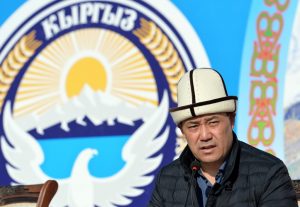A few days after refusing to hear an appeal from the the Kyrgyz Central Election Commission (CEC), due to a technicality, the Kyrgyz Supreme Court’s Constitutional Chamber has agreed to hear a similar appeal, a combination of separate appeals filed by the Reforma Party and two citizens.
The new appeal, like the CEC’s earlier attempt, challenges the law adopted last month by the sitting parliament to cancel the CEC’s decision to scheduled the rerun of parliamentary elections for December 20. The bill — supported by 83 deputies — suspended two articles of the constitutional law on elections. It passed in three readings at once, a quick pace even amid Kyrgyzstan’s already hectic political scene. The same day, the parliament adopted a bill that lowered the national threshold which parties must meet to enter into parliament from 7 percent of total votes to 3 percent. The bill also lowered the mandatory deposit from 5 million Kyrgyz soms ($61,124) to 1 million Kyrgyz soms ($12,224) and abolished voting using the now notorious Form No. 2.
It’s of little surprise that opposition parties, like Reforma, and the CEC are challenging the setting aside of constitutional norms. The lowering of the deposit and the threshold are broadly popular moves, while cancelling the CEC’s decision on a new election date smacks of political maneuvering.
Acting Kyrgyz President and current Prime Minister Sadyr Japarov signed the bills into law on October 22, the same day they flew through parliament. The parliament effectively kicked the do-over election into 2021, though the date remains unspecified.
On October 24, the CEC also named a date for early presidential elections: January 10.
Japarov had earlier floated the idea of constitutional revisions — which would arguably necessitate a referendum — allowing him to run for the presidency. The current Kyrgyz Constitution forbids an acting or interim president from taking part in presidential elections.
As chaotic as the last month has been, Kyrgyzstan has been in similar positions before. In 2010, after the overthrow of the Kumanbek Bakiyev regime, Roza Otunbayeva became interim president. At the time of the revolution she was a member of parliament in the Social Democratic Party (SDPK) faction and had been put forward by the opposition to be leader in April. She served as interim president from July 2010 to December 2011, a period predated by a constitutional referendum (June 2010) and which included new parliamentary elections (October 2010) and then presidential elections (October 2011).
This time around the timeline may not be so drawn out. And whereas Otunbayeva and the victorious opposition tinkered with the constitution to take power away from the president, Japarov seems to have other ideas.
Japarov in late October declared his intention to run for the presidency by stepping down from the acting presidency in December.
“A presidential election will take place on January 10. I will step down in early December and take part in the poll. I will participate in the race as an ordinary citizen. If I win, then I will be president, if not I will remain an ordinary citizen,” Japarov said. In the meantime, he’s acting president and taking advantage of the limelight that provides. For example, Japarov is in Batken region today, meeting with officials, activists, and people.
If the Supreme Court’s Constitutional Chamber finds merit in the Reforma petition, the parliamentary re-election could be on again for December. The date for the presidential election has not yet been challenged. Meanwhile, presumptive candidates are positioning themselves for the run. In addition to Japarov, Bektur Asanov — a former MP, governor of Jalal-Abad, and ambassador — announced his intention to run. Asanov, who had been jailed in April 2017 on charges of planning to seize power, was released in February 2019. The leader of the Butun Kyrgyzstan party, Adakhan Madumarov, has also stated his intention to run, along with author Arstan Alai, economist Kuban Choroyev, and Nazarbek Nyshanov, an activist. There’s also talk that Omurbek Babanov — who lost in the 2017 election to Sooronbay Jeenbekov and consistently ranks among Kyrgyzstan’s most trusted politicians — will run, but no firm commitment yet.
In 2017, two months before the presidential election, a staggering 59 people — 11 nominated by parties and 48 individuals — had filed to run.

































